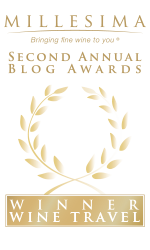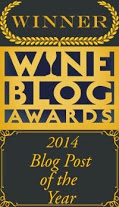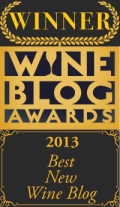If you missed my interview with Jean-Luc Le Dû, here is your second chance…
 |
After winemakers, the most valuable people in the wine business today are passionate retailers. Sommeliers, wine critics, importers and anyone else involved in the world of wine — they’re all important, just not as much. Why? Retailers interact face-to-face with hundreds of thirsty consumers, sometimes on a weekly basis, and thus have the best opportunity to build trust, educate, and inspire people to be curious and drink more adventurously.
Note the distinction between retailer and passionate retailer. The city has loads of drab wine and liquor stores hawking booze to alkies with the same exuberance the trash men have for tossing our garbage into their trucks — they don’t care what it is as long as they move it. The good ones, though, are invaluable to the industry and consumers alike because their fervor for wine is as contagious as singing in a Southern Baptist Church. Last week, we caught up with one of those good guys — Jean-Luc Le Dû.
Jean-Luc is the owner of Le Dû’s Wines, a wine and spirits store in the West Village. Originally from Gourin, France, he currently lives downtown in Battery Park. Prior to opening his retail shop in 2005, Jean-Luc spent ten years as chief sommelier at Daniel, so he knows his wine. We talked recently before one of his outstanding weekly in-store tastings.
What was your first memorable wine experience?
In 1987, I was invited to my aunt and uncle’s house in Queens for Thanksgiving dinner. I was 22, knew nothing about wine and brought a very cheap négociant (a wine merchant who buys, bottles and sells must or wine from an outside source, under their own label) bottling of Saint-Émilion. The gentleman sitting next to me, the father of my cousin’s girlfriend, brought a bottle of 1964 Cheval Blanc. I commented to him, “Oh, this is great, we brought wines from the same village–we have good taste!” The guy was very nice about it and said, “Actually, you are right–it’s a different estate, but the same village.” Then I tasted his wine and I was blown away. The following week I decided I would find a bottle because I had never tasted something like that before and wanted to do so again, but the one I found was $250 and way above my pay range. After that experience, I decided to devote $100 a week to my wine education by visiting wine shops and trying new bottles.
What was your first job in the wine business?
I was the head captain at Bouley for 3 years, but I had wanted to leave and work as a sommelier. Right after Bouley, I went to One if by Land, Two if by Sea, the only opportunity that presented itself at the time. It was 1994, and there really weren’t a lot of sommeliers in New York. There were maybe three or four. I didn’t stay there very long, but I got my first chance to compose a wine list and to turn people on to wine, so that was very exciting, because that was where I really wanted to go with my career. I went to Daniel right after that.
What is the role of a sommelier today: teach, guide or take orders from the customer?
The role of the sommelier on the floor is to first be a wine waiter. The sommelier is there to take your wine order and, depending on the level of decorum in the restaurant, maybe taste it to make sure it’s good or smell it to see if it’s corked. That is their first role. Everything else is extra. A sommelier should really be a psychologist at the table. He or she is there to gauge the customer, and understand if it’s a couple on a day when they don’t want to be bothered and just want two glasses of wine, or understand if someone is passionate about wine and is really eager to chat. You really have to read your customers to see how much involvement they want from you at the table. Not everybody’s looking for a transcendental experience from the sommelier.
 |
How did you decide to make the transition to retail?
I had been at Daniel for ten years, and it was a wonderful experience, but I wanted to do other things. The West Village is one of the most vibrant places in the city, and I wanted to be involved in the fabric of it. I felt if we provided a great product and great service, we would be able to attract great customers.
What are the pros and cons of the retail biz?
Right now is an amazing time to be in retail. Something unfortunate happened in the mid-’90s and we are finally getting out of it — the era of the wine critic. For a while it was hard to sell a wine if it hadn’t been stamped with approval by Robert Parker, or others; but now you see customers are getting much more confident. In the last year or two, more and more people are listening to the writing we do independently at our shop. We write emails that reflect our personal passion, and I think people are more interested in that point of view rather than that of a wine critic.
Have New Yorkers’ wine preferences changed over the last few years?
People drink less and less Bordeaux. Bordeaux was the main wine region sold in shops for a long time, but they have priced themselves out of the market; it’s too bad, because there are some delicious wines made there. However, there is really a spirit of adventure in the New York consumer that is very exciting given all the regions around the world worth exploring. Take Chile and Argentina–they were on shelves ten years ago because they were inexpensive, but are today making many delicious wines. And in France, there are areas like the Jura that have been seeing a lot of interest in the last two or three years. And there has never been a better time to drink American wines than today.
Are there any wines you refuse to carry?
[laughs] Ummm, no. Why don’t I tell you about the wines we do carry. We work with independent, artisanal wineries and domaines from around the world that are family or privately owned, that work organically, biodynamically or as close to as possible as they can. We work with wineries that don’t use GMOs and are passionate about the place that they are from and that come from real terroir.
What happened to the Australian wine market?
It was really a segment of the Australian wine industry that screwed it up for everybody. Yellowtail and those huge brands that were created played on margins and currency — that’s how they made money — and the second the currency wasn’t in their favor, the whole thing fell apart. All of a sudden they needed to sell a billion gallons of crap to make money. And consequently, everything from Australia was viewed as bad. Yet there are a lot of old vines and very passionate, dedicated winemakers that make great stuff; little by little we are seeing those wines trickle back into the market.
 |
Which wine or grape is the least understood or respected?
Beaujolais. No, the Gamay grape. Don’t say Beaujolais in this interview, it’s like a dirty word. If you say that name, people will think of a headache-inducing rush of a wine that’s really not pleasant and is a hyper-fruity, banana-smelling concoction. But the wines from the Cru of Beaujolais like Morgon, Moulin-à-Vent, and Fleurie are some of the most satisfying, quenching, lively wines in the world. If you told me I had to drink the same wine, from the same region, night after night, I would say Beaujolais. They are great when they are young, great when they are old; they are just pretty. People are now discovering they are cellar-worthy at the higher end.
Which wine region should consumers explore for good value and quality?
Sicily. It is really an up-and-coming region that has a long history — I think it was the first place vines were planted in Italy. This is an area that is warm, but has a very long growing season; there is very old terrain, many unique soils, and a series of hills and mountains on which grapes can be grown at high elevations. What’s being done in the Etna D.O.C. is fantastic–they are growing on black rock and old lava formations. For me, they are some of the most exciting wines of Europe. And a good Negroamaro costs as little as $12 or $13. Really great stuff for the money.
What do you drink when relaxing at home?
I generally like simple wines at home. Simple foods require simple wines. But I also love Spanish Riojas. I am a huge fan of Pinot Noir from the Sonoma Coast. There is good Pinot Gris being made in Oregon. Also, aged German Rieslings are one of the great beauties of this world, and yet they aren’t that expensive.
If you could be traveling somewhere else right now, where would you be?
Sicily. There are not many vineyards in the world that have such a dramatic setting, sitting up to 2700 feet on black lava rock with very old vines. Then you can visit some of the most beautiful archaeological sites in Europe, and hit the beaches on the Tyrrhenian Sea. I think this would be the perfect wine region to spend time in, and I would love to make it my next trip.
Le Dû’s Wines, 600 Washington St., 212-924-6999








